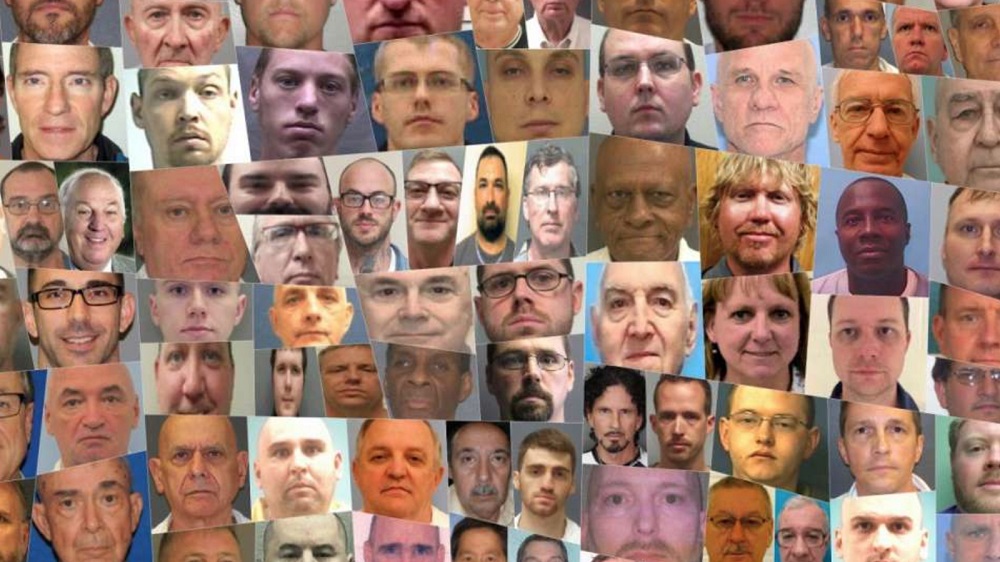
This collection of mug shots includes a portion of the 220 people who, since 1998, worked or volunteered in Southern Baptist churches and were convicted of or pleaded guilty to sex crimes. The Houston Chronicle and San Antonio Express-News published the first part of an investigative series on SBC abuse on Feb. 10, 2019. (Screenshot from Chronicle website)
February 18, 2019
Seventeen years after the Boston Globe exposé of sex abuse in the Catholic Church, two Texas newspapers have published a similar exposé of abuse in Southern Baptist churches.
Although the National Catholic Reporter had reported on sex abuse by priests since the mid-1980s, it was the Boston Globe reporting in 2002 that captured the attention of the nation. Likewise, there have been stories about Baptist ministers in the past, but they had not captured national attention like this month's coverage by the Houston Chronicle and San Antonio Express-News.
The existence of clergy sexual abuse in the Southern Baptist Convention provides no satisfaction to us Catholics, but it does allow us to test our theories about the causes of abuse.
The Baptist scandal shows us that at least five explanations of the sex abuse crisis in the Catholic Church don't hold up:
- It is not celibacy. Many liberal critics tried to blame the sex abuse crisis in the Catholic Church on priests' vow to abstain from sex, yet Baptists are having the same problem, and there is no equivalent requirement for Southern Baptist Convention ministers. Most Baptist predators are married men. There are good reasons for married priests in the Catholic Church, but marriage does not prevent a man from abusing.
- It is not homosexuality. Many conservative critics tried to blame the sex abuse crisis in the Catholic Church on homosexual priests, but most of the Baptist ministers alleged to have committed abuse are heterosexual. Studies have also found that most of the priests abusing boys were heterosexual.
- It is not just the hierarchy. Most commentators, myself included, have quite rightly been very hard on the Catholic bishops for not dealing with abusive priests. But the Southern Baptist Convention is very decentralized in governance, and it has also had problems. Neither governance structure has done well in dealing with abusive clergy or protecting children.
- It is not the liberal reforms of the Second Vatican Council. Many conservative Catholics tried to blame the sex abuse crisis on the reforms that came from the Second Vatican Council, the meeting of bishops from all over the world from 1962 to '65 that attempted to update the church to deal with the modern world. Southern Baptists had no council, and they are having the same problems.
- It is not the lawyers. Many priests and bishops blame the crisis on lawyers who have gotten very rich from suing the Catholic Church on behalf of victims of abuse. So far, lawyers have not played a major role in the Southern Baptist crisis. Baptist finances are very decentralized. There are few deep pockets. There is little incentive for a lawyer to sue a small Baptist congregation. Survivors have come forward without lawyers, just as they did early in the Catholic crisis before episcopal stonewalling forced them to get lawyers.
Just as important is what Southern Baptists can learn from Catholics about how to deal with the sex abuse crisis. How can they avoid making the same mistakes that Catholics made?
Advertisement
- Don’t think it is going to blow over. When victims come forward and scandal erupts, it is just beginning, not ending. As bad as the reports in the Texas newspapers sound, this is the tip of the iceberg. After the Boston Globe exposé, several thousand more victims came forward to tell their stories. Victims get angry and empowered by seeing stories of abuse survivors. There is every reason to believe that the current media coverage of abuse in Southern Baptist churches will stimulate more survivors to come forward. Get ready.
- Report all accusations of abuse to the police. Abuse is not just a sin, it is a crime. Don’t think it can be dealt with internally by the church.
- Adopt and implement a zero-tolerance policy toward abusive clergy. Christians are supposed to be forgiving, but that does not mean returning abusive men to ministry. No one has a right to be a minister. No one is indispensable. The protection of children is paramount.
- Establish a system for transparent and credible investigations of clergy accused of abuse. I don’t know enough about the governance of the Southern Baptist Convention to recommend a procedure, but I can tell you that leaving it to the other clergymen or members of the accused’s congregation will not work.
- Put the victims first. In every discussion, the central issue should be what will help the survivors of abuse in healing and recovery. The reputation of the church, the rehabilitation of the minister, church finances, and the possibility of scandal must give way to the priority of helping the victims.
Sex abuse is not just a problem in the Catholic Church. Sex abuse has now been exposed in almost every denomination and religion. Anyone who thinks their religious tradition is exempt is blind to the facts.
Nor is it just a religious phenomenon, since it has been seen in schools, scouting, coaching, counseling, daycare, families, and many other settings. According to the National Center for Victims of Crimes, one in five girls and one in 20 boys is a victim of child sexual abuse. If this were the measles, it would be declared an epidemic.
Although Baptists and Catholics are currently in the middle of the storm, hopefully someday they will be able to unite in being part of the solution to this crisis, rather than part of the problem.
[Jesuit Fr. Thomas Reese is a columnist for Religion News Service and author of Inside the Vatican: The Politics and Organization of the Catholic Church.]




